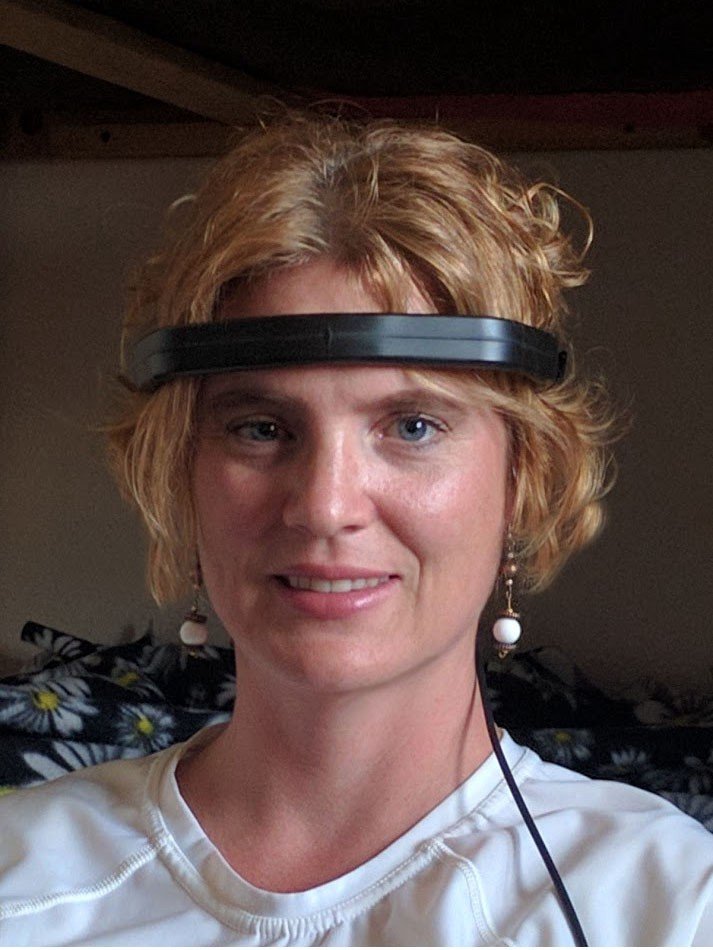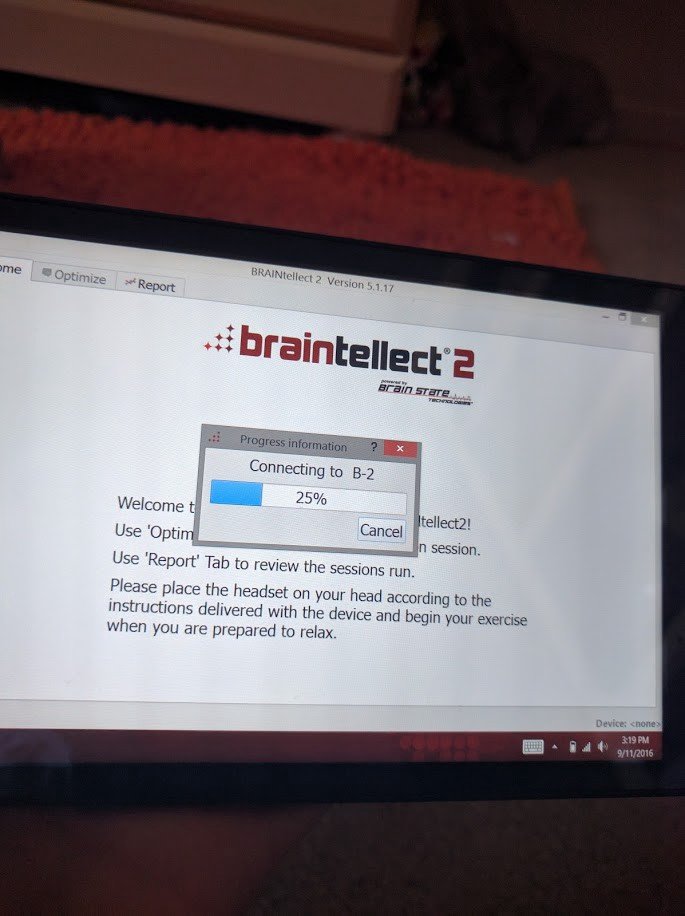I stumbled upon a device that potentially influences neuroplasticity, so I did the only logical thing: I bought it.
Here’s how it works:
STEP ONE:
Place the device on your head (it’s a light-weight, Velcro-secured headband with four EEG sensors—two for the temporal lobes and two for the frontal)

STEP TWO:
Turn on your portable EEG (the size of your palm)

I feel like Vanna White.
STEP THREE:
Hook up ear buds to the accompanying tablet (installed with software designed to convert your brain activity into lovely sounds), and place the ear buds in your ears.

STEP FOUR:
Turn on your tablet, select an amount of time you would like your session to be (approximately 10 minutes), and push “play." Close your eyes and listen to your brain. You will hear a series of pleasant-sounding "notes" or "tones" that are simply audio conversions of the electrical activity from your brain.

You are now engaging in a process called brainwave “optimization.” Brainwave optimization is in the “lineage” of biofeedback, but it’s entirely different.
HOW BRAINWAVE OPTIMIZATION IS DIFFERENT THAN BIOFEEDBACK
Biofeedback and neurofeedback have set “goals” to achieve. The subject is rewarded or inhibited for how they performed, thereby encouraging them to condition their brain or behavior in a certain way.

Brainwave optimization has NO parameters. There are no set goals given to the subject. This means there are no rewards, inhibitors, punishments, or values placed on any activity coming from the brain or the subject. The subject is simply asked to sit still and listen to their brain. It is a passive activity done by the BRAIN. Not by the subject, per se.
WHAT HAPPENS NEXT
This is the freaky part. The brain hears what is coming through the headphones. It then interprets the information, recognizes itself, and automatically makes corrections to itself in order to operate at maximum efficacy.
WHAT?
I'm not really sure what that means. All I know is that it's like your brain is looking at itself in the mirror, and it "sees" itself, and what it perceives to be out of balance, it will adjust until it begins to hear something more in balance. That's the best I can say. I don't get it. But apparently our brains are....well....intelligent. If that's not paradoxical.
SO WHAT IS MAXIMUM EFFICACY?
Maximum efficacy of the brain is when the brain is operating out of the parasympathetic nervous system—the system responsible for the automatic functions behind rest and sleep, conservation of energy, digestion, stress management, social communication, and self-soothing. This system, run by the Vagus nerve, helps you make memories, it helps you breathe, it initiates your body’s relaxation response, and prevents inflammation, among other things.
The Vagus nerve is a freaking cool nerve. My favorite body part, by far. It is the LONGEST nerve in the brain, and extends down into the abdominal region. It can also “control the movement of our laryngeal muscles. It can even regulate the ability to listen to human voices well because it has projections to the muscle which can modulate the middle ear bones…all of these are highly adaptive for social communication, emotional expression, and stress management.”
~ Sung Lee, M.D., Research Coordinator for Brainstate Technologies; Scientific Advisor of Brain World Magazine.
In short, this nerve--this parasympathetic system--is the bomb.
When your mind and body are in a calm state, then all other operations can function optimally--the way they did when we were kids, or hypothetically similar to it. Physical health, disease, mental mood and agility, memory, stamina, creative processes, and essentially all metabolic processes are improved when we operate out of this nervous system. Just think how you feel when you are truly relaxed and calm. You are in a good mood. Your body doesn't hurt. You are thinking clearly. You have good ideas. You want to help. You want to move. You want to do cool stuff.
This is because of your Vagus nerve. It keeps all of your hormones and operations in balance. If a human being undergoes enough of the wrong kind of stress, either acutely or chronically, the brain can get stuck in sympathetic ("fight or flight") and primitive ("freeze and faint") patterns that were meant to protect only during stress. This “stuck” pattern results in a chain of metabolic devolutions in the body that would otherwise not occur if the Vagus nerve were in charge. Metabolic devolutions lead to any number of things, from disease to malfunction.
So the entire goal is to get the Vagus nerve back in charge! Once that happens, our brain will do the rest. Which is pretty awesome.

And the only way to get the Vagus nerve back in charge is to get the brain into a state that it can handle. We have to artificially relax the brain enough so that the sympathetic system won't have anything to do but relinquish, and the Vagus will kick in. The brain will reroute neuropathways to be more in communication with the Vagus nerve. This is where the neuroplasticity comes in.
“The Clinical care field has vastly underestimated neuroplasticity. There is much too much unfounded pessimism about what our capacity is to rewire our brains. We have to get the data our there which shows that there is more neuroplasticity than was previously appreciated.”
My BEST attempt to explain what is actually happening is as follows:
The Vagus nerve hears the activity of the brain and recognizes some of it as sympathetic systems in play. Vagus wants to be in charge. It nudges the sympathetic ganglia and says, “Guys, you’re doing all the work. That’s my job. I’ve got migraines over here, and memory loss over here, and insomnia over here because you won’t let me tell them what to do. That spot of spaghetti sauce on the carpet is NOT a saber tooth tiger. You really need to quit freaking out. Let me handle this. Look at the poor guy. He’s run ragged. We gotta give him a break.”
“A more resilient brain is more likely to make the set point adjustments in accordance with the actual demands of the circumstances at hand. Whereas a less resilient brain is more apt to get stuck in the set points of the preceeding demand, such as war.”
Most human beings have at least some level of unhealthy sympathetic responses running the show, where they should have parasympathetic ones. These stuck patterns could have come from any number of accumulated “trivial” traumas, such as getting rejected by the girl of our dreams at the 7th grade dance, or being fired from our favorite job after college.
Or they could have come from something more severe, such as an unexpected enemy ambush resulting in the loss of a limb, or the tragic loss of a child.
In reality, our sympathetic nervous system kicks in WAY too much, when it’s the Vagus nerve that should be doing the talking. Brainstate Technologies helps to settle the brain down so it can let the parasympathetic system start to kick in again. And when it does, miracles happen.
Better sleep, better memory and recall, more creativity, more energy, better performance (at work or in athletics), and improved mood are just the beginning. I believe the company is rather limited in talking about what the FDA would refer to as "treat" "prevent" "cure" and "diagnose" illness, but they are NOT limited in talking about what our brains are capable of, and from what I gather, we could be a lot healthier and happier than we are.
All I can tell you is, buying this device was the best $1,500 I have ever spent. I'm not saying I'm Hulk Hogan or anything, but I AM sleeping better, managing my stress better, feeling better (physically and emotionally), back to being creative again, and all around on my mark. And I've only been using the damn thing for a couple of months, and only twice a week at that. My dad uses his almost every day for his insomnia and adrenal failure. BOTH have improved markedly.
Now, that being said, I don't know what's medically appropriate to claim. All I know is that SINCE I started using this thing, I found immediate and drastic results. I guess some people don't notice change until it's been a few weeks, and everyone is different. But I figure getting the Vagus nerve closer to in charge when it's supposed to be in charge, can't be a bad thing.
The interesting part is that there are other kinds of neuroplasticity this technology offers as well, such as brain remapping after trauma (as with seizure and stroke), and injury (as with concussion and brain contusion). I can’t begin to do the subject any justice other than to say that the technology has been successful in helping people achieve and surpass goals they had hoped to accomplish from using the technology. But for those individuals interested in this technology for this purpose, the recommendation is to have a technician do a full-brain EEG for all of the lobes, not just the temporal and frontal.
Either way, the sessions are passive, non-invasive, and even relaxing.
So if you suffer from mental mapping issues like PTSD or autism, chemical dependancies like drug addiction, behavioral problems like aggressive behavior, physical issues like migraines or insomnia, or emotional issues like sadness and depression, neuroplasticity is the new black.
